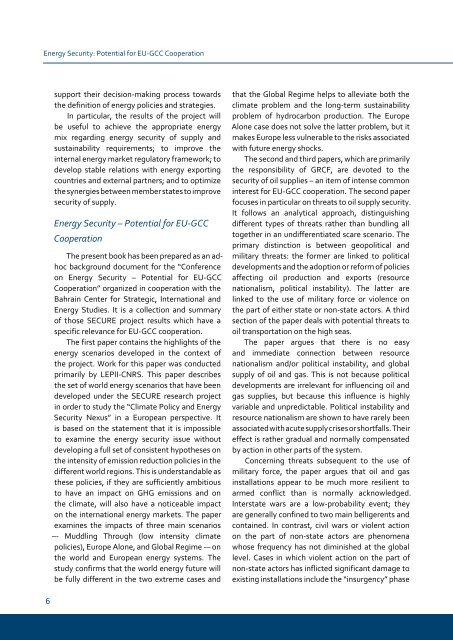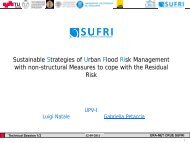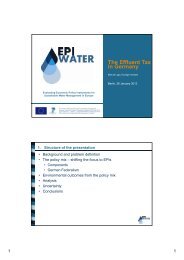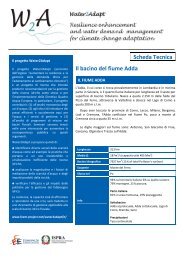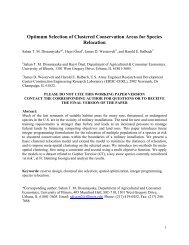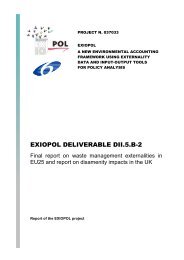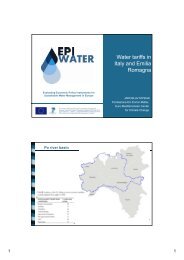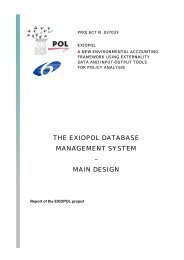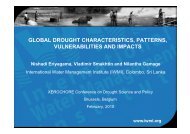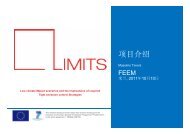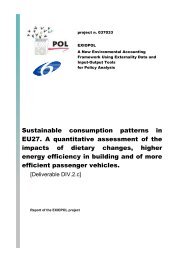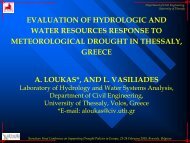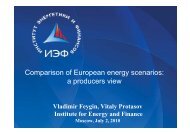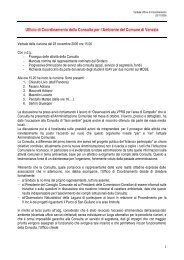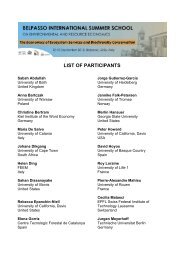Gulf and European Energy Supply Security - Feem-project.net
Gulf and European Energy Supply Security - Feem-project.net
Gulf and European Energy Supply Security - Feem-project.net
Create successful ePaper yourself
Turn your PDF publications into a flip-book with our unique Google optimized e-Paper software.
<strong>Energy</strong> <strong>Security</strong>: Potential for EU-GCC Cooperation<br />
support their decision-making process towards<br />
the definition of energy policies <strong>and</strong> strategies.<br />
In particular, the results of the <strong>project</strong> will<br />
be useful to achieve the appropriate energy<br />
mix regarding energy security of supply <strong>and</strong><br />
sustainability requirements; to improve the<br />
internal energy market regulatory framework; to<br />
develop stable relations with energy exporting<br />
countries <strong>and</strong> external partners; <strong>and</strong> to optimize<br />
the synergies between member states to improve<br />
security of supply.<br />
<strong>Energy</strong> <strong>Security</strong> – Potential for EU-GCC<br />
Cooperation<br />
The present book has been prepared as an adhoc<br />
background document for the “Conference<br />
on <strong>Energy</strong> <strong>Security</strong> – Potential for EU-GCC<br />
Cooperation” organized in cooperation with the<br />
Bahrain Center for Strategic, International <strong>and</strong><br />
<strong>Energy</strong> Studies. It is a collection <strong>and</strong> summary<br />
of those SECURE <strong>project</strong> results which have a<br />
specific relevance for EU-GCC cooperation.<br />
The first paper contains the highlights of the<br />
energy scenarios developed in the context of<br />
the <strong>project</strong>. Work for this paper was conducted<br />
primarily by LEPII-CNRS. This paper describes<br />
the set of world energy scenarios that have been<br />
developed under the SECURE research <strong>project</strong><br />
in order to study the “Climate Policy <strong>and</strong> <strong>Energy</strong><br />
<strong>Security</strong> Nexus” in a <strong>European</strong> perspective. It<br />
is based on the statement that it is impossible<br />
to examine the energy security issue without<br />
developing a full set of consistent hypotheses on<br />
the intensity of emission reduction policies in the<br />
different world regions. This is underst<strong>and</strong>able as<br />
these policies, if they are sufficiently ambitious<br />
to have an impact on GHG emissions <strong>and</strong> on<br />
the climate, will also have a noticeable impact<br />
on the international energy markets. The paper<br />
examines the impacts of three main scenarios<br />
–- Muddling Through (low intensity climate<br />
policies), Europe Alone, <strong>and</strong> Global Regime -– on<br />
the world <strong>and</strong> <strong>European</strong> energy systems. The<br />
study confirms that the world energy future will<br />
be fully different in the two extreme cases <strong>and</strong><br />
that the Global Regime helps to alleviate both the<br />
climate problem <strong>and</strong> the long-term sustainability<br />
problem of hydrocarbon production. The Europe<br />
Alone case does not solve the latter problem, but it<br />
makes Europe less vulnerable to the risks associated<br />
with future energy shocks.<br />
The second <strong>and</strong> third papers, which are primarily<br />
the responsibility of GRCF, are devoted to the<br />
security of oil supplies – an item of intense common<br />
interest for EU-GCC cooperation. The second paper<br />
focuses in particular on threats to oil supply security.<br />
It follows an analytical approach, distinguishing<br />
different types of threats rather than bundling all<br />
together in an undifferentiated scare scenario. The<br />
primary distinction is between geopolitical <strong>and</strong><br />
military threats: the former are linked to political<br />
developments <strong>and</strong> the adoption or reform of policies<br />
affecting oil production <strong>and</strong> exports (resource<br />
nationalism, political instability). The latter are<br />
linked to the use of military force or violence on<br />
the part of either state or non-state actors. A third<br />
section of the paper deals with potential threats to<br />
oil transportation on the high seas.<br />
The paper argues that there is no easy<br />
<strong>and</strong> immediate connection between resource<br />
nationalism <strong>and</strong>/or political instability, <strong>and</strong> global<br />
supply of oil <strong>and</strong> gas. This is not because political<br />
developments are irrelevant for influencing oil <strong>and</strong><br />
gas supplies, but because this influence is highly<br />
variable <strong>and</strong> unpredictable. Political instability <strong>and</strong><br />
resource nationalism are shown to have rarely been<br />
associated with acute supply crises or shortfalls. Their<br />
effect is rather gradual <strong>and</strong> normally compensated<br />
by action in other parts of the system.<br />
Concerning threats subsequent to the use of<br />
military force, the paper argues that oil <strong>and</strong> gas<br />
installations appear to be much more resilient to<br />
armed conflict than is normally acknowledged.<br />
Interstate wars are a low-probability event; they<br />
are generally confined to two main belligerents <strong>and</strong><br />
contained. In contrast, civil wars or violent action<br />
on the part of non-state actors are phenomena<br />
whose frequency has not diminished at the global<br />
level. Cases in which violent action on the part of<br />
non-state actors has inflicted significant damage to<br />
existing installations include the “insurgency” phase


